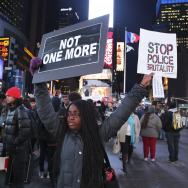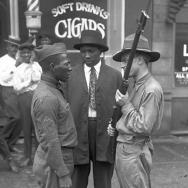For those searching for answers following the killing of George Floyd at the hands of police and the resulting unrest across the nation, it’s important to understand the history and context of racism in the United States.
The University of Chicago Press has identified 11 books that it has published that provide a primer on police violence, educational inequity, and other forms of institutional racism. These books come from a variety of perspectives and disciplines, including education, history, medicine and sociology, but they all have similar missions: to better inform our opinions, offer insight into the perspectives and lives of others, and to give voice to those who have often been silenced.
You can browse even more books on these topics in the Press’s subject listings. A collection of free journal articles on policing, civil rights, and racism is also available here.
The Torture Letters: Reckoning with Police Violence
Laurence Ralph
(Available as a free e-book until June 6.)
In The Torture Letters, Laurence Ralph chronicles the history of torture in Chicago, the burgeoning activist movement against police violence, and the American public’s complicity in perpetuating torture at home and abroad.
Citizen Brown: Race, Democracy and Inequality in the St. Louis Suburbs
Colin Gordon
The 2014 killing of Michael Brown in Ferguson, Missouri ignited nationwide protests and brought widespread attention police brutality and institutional racism. But Ferguson was no aberration. As Colin Gordon shows, the events in Ferguson exposed not only the deep racism of the local police department but also the ways in which decades of public policy effectively segregated people and curtailed citizenship, not just in Ferguson but across the St. Louis suburbs.
Tacit Racism
Anne Warfield Rawls and Waverly Duck
In Tacit Racism, Anne Warfield Rawls and Waverly Duck illustrate the many ways in which racism is coded into the everyday social expectations of Americans. They argue that these interactions can produce racial inequality, whether the people involved are aware of it or not, and that by overlooking tacit racism in favor of the fiction of a “color-blind” nation, we are harming not only our society’s most disadvantaged—but endangering the society itself.
Crusade for Justice: The Autobiography of Ida B. Wells, Second Edition
Edited by Alfreda M. Duster, with a new foreword by Eve L. Ewing and a new afterword by Michelle Duster
Ida B. Wells is an American icon of truth telling. Born to slaves, she was a pioneer of investigative journalism, a crusader against lynching, and a tireless advocate for suffrage, both for women and for African Americans. This engaging memoir, originally published 1970, relates Wells’s private life as a mother as well as her public activities as a teacher, lecturer, and journalist in her fight for equality and justice.
Remembering Emmett Till
Dave Tell
Take a drive through the Mississippi Delta today, and you’ll find a landscape dotted with memorials to major figures and events from the civil rights movement. Perhaps the most chilling are those devoted to the murder of Emmett Till, a tragedy of hate and injustice that became a beacon in the fight for racial equality.
Beyond the Usual Beating: The Jon Burge Police Torture Scandal and Social Movements for Police Accountability in Chicago
Andrew S. Baer
Chicago police commander Jon Burge decades-long tenure on the Chicago police force was marked by racist and barbaric interrogation methods, including psychological torture, burnings, and mock executions—techniques that went far “beyond the usual beating.” After being exposed in 1989, he became a symbol of police brutality and the unequal treatment of nonwhite people, and the persistent outcry against him led to reforms such as the abolition of the death penalty in Illinois.
Murder in New Orleans: The Creation of Jim Crow Policing
Jeffrey S. Adler
Using the history of New Orleans crime, Adler shows how the vicious response to African American crime occurred even as such violence plunged in frequency—revealing that the city’s cycle of racial policing and punishment was connected less to actual patterns of wrongdoing than to the national enshrinement of Jim Crow. Rather than some hyperviolent outlier, Adler argues, this Louisiana city was a harbinger of the endemic racism at the center of today’s criminal justice state. Murder in New Orleans lays bare how decades-old crimes, and the racially motivated cruelty of the official response, have baleful resonance in the age of Black Lives Matter.
Ghosts in the Schoolyard: Racism and School Closings on Chicago’s South Side
Eve L. Ewing
Rooting her exploration in the historic African American neighborhood of Bronzeville, Asst. Prof. Eve L. Ewing of UChicago’s School of Social Service Administration reveals that black communities see the closing of their schools—schools that are certainly less than perfect but that are theirs—as one more in a long line of racist policies. She argues that the fight to keep them open is yet another front in the ongoing struggle of black people in America to build successful lives and achieve true self-determination.
The Color of Mind: Why the Origins of the Achievement Gap Matter for Justice
Derrick Darby and John L. Rury
American students vary in educational achievement, but white students in general typically have better test scores and grades than black students. Why is this the case, and what can school leaders do about it? In The Color of Mind, Derrick Darby and John L. Rury answer these pressing questions and argue that we cannot make further progress in closing the achievement gap until we understand its racist origins.
Building the Prison State: Race and the Politics of Mass Incarceration
Heather Schoenfeld
Reframing the story of mass incarceration, Heather Schoenfeld illustrates how the unfinished task of full equality for African Americans led to a series of policy choices that expanded the government’s power to punish, even as they were designed to protect individuals from arbitrary state violence. To reduce the number of people behind bars, Schoenfeld argues that we must transform the political incentives for imprisonment and develop a new ideological basis for punishment.
The Death Gap: How Inequality Kills
David A. Ansell, MD
When detailing the many things that the poor have not, we often overlook the most critical—their health. The poor die sooner. Blacks die sooner. And poor urban blacks die sooner than almost all other Americans. In The Death Gap, David A. Ansell gives a grim survey of these realities, drawn from observations and stories of his patients in Chicago.
Further reading:
- Collection of free journal articles on policing, civil rights and racial justice
- UChicago Press subject listings
—Adapted from an article first published by the University of Chicago Press

